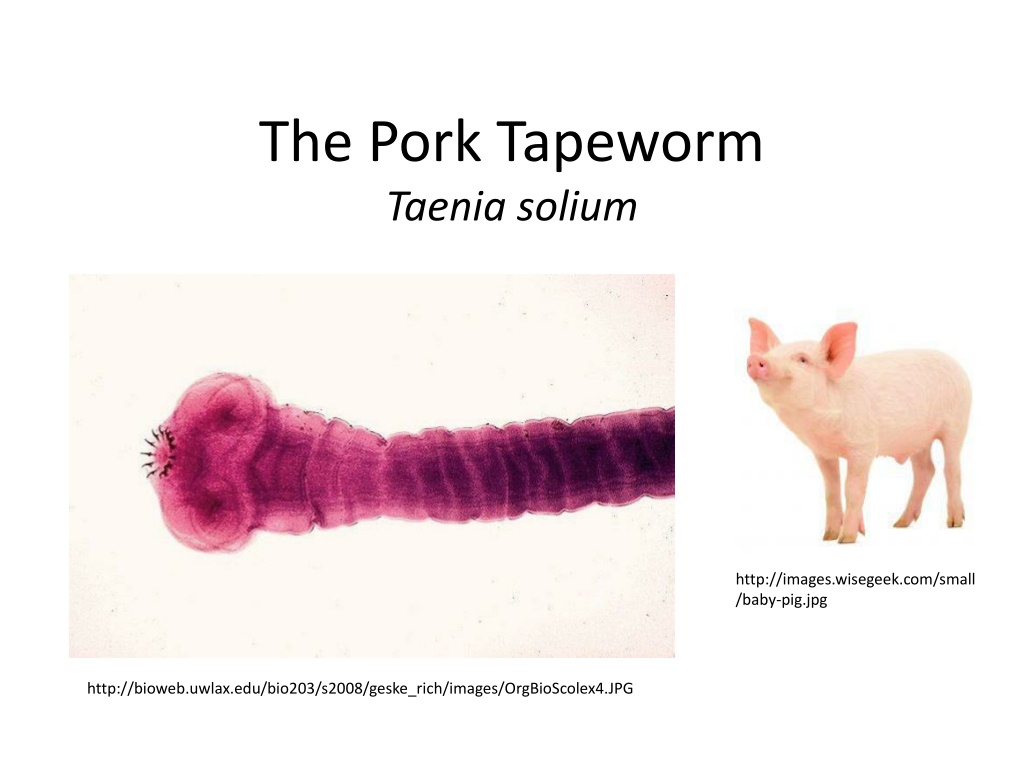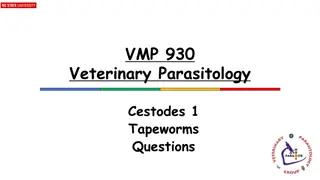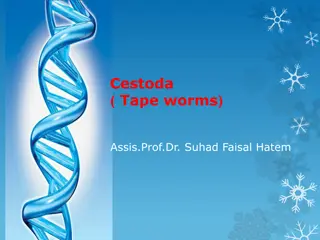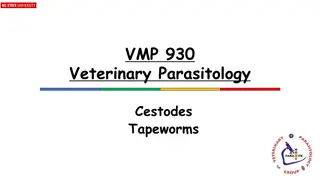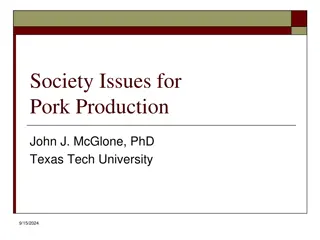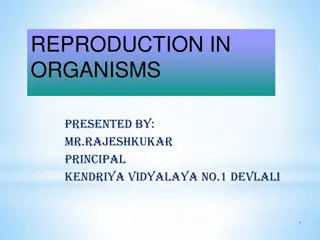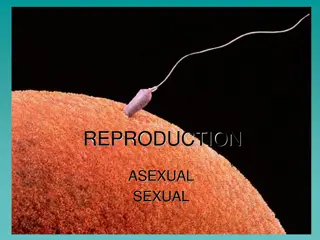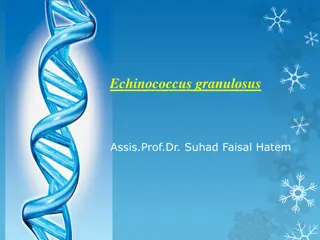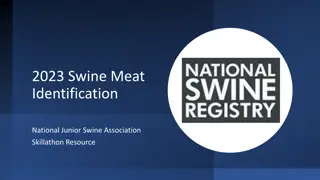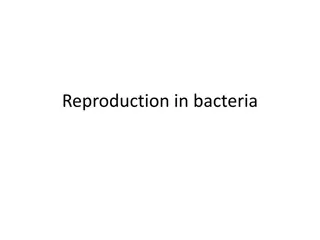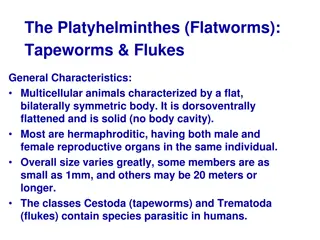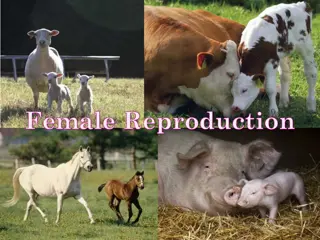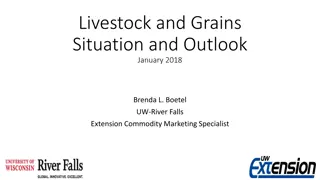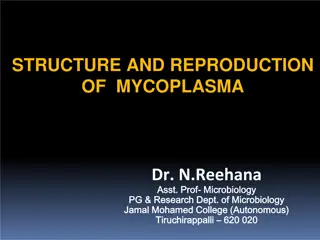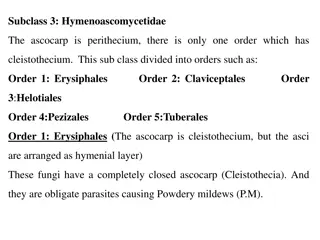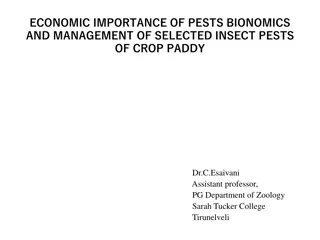Understanding the Pork Tapeworm, Taenia solium: Appearance, Lifecycle, and Reproduction
The pork tapeworm, Taenia solium, is a potentially dangerous flatworm to humans, with a white ribbon-like body that can grow up to 9 meters in length. This parasite has distinct body parts including the scolex, neck, and strobilia. Humans can get infected by ingesting larvae in measly pork, leading to the development of adult tapeworms in the intestine. The tapeworm is a hermaphrodite, capable of self-fertilization, and produces thousands of eggs in gravid proglottids. Understanding its lifecycle is crucial for prevention and treatment.
Download Presentation

Please find below an Image/Link to download the presentation.
The content on the website is provided AS IS for your information and personal use only. It may not be sold, licensed, or shared on other websites without obtaining consent from the author. Download presentation by click this link. If you encounter any issues during the download, it is possible that the publisher has removed the file from their server.
E N D
Presentation Transcript
The Pork Tapeworm Taenia solium http://images.wisegeek.com/small /baby-pig.jpg http://bioweb.uwlax.edu/bio203/s2008/geske_rich/images/OrgBioScolex4.JPG
Appearance and General Information The pork tapeworm is a flatworm, belonging to the phylum Platyhelminthes. It is one of the most potentially dangerous adult tapeworms to humans. 3 Its body is white and ribbon like. 5 It is about 6 mm wide, 4 and usually 2 to 3 metres long, but some specimens can reach over 9 metres. 3 Bio390parasitology.blogspot.com
Parts of the Tapeworm Taeniasolium has 3 main body parts: 1. 2. 3. The head (scolex) A neck An elongated body (the strobilia) http://3.bp.blogspot.com/-YgUB8X7-BnM/UDOsSLILGNI/AAAAAAAAK6o/yYyFz7- tJac/s400/Taenia_solium_body.gif
Tapeworm Scolex The Scolex The scolex of the tapeworm is spheroid and about 1 mm in diameter. It has 4 suckers surrounding the rostellum (mouthparts), for attachment. 5 The Strobilia https://encrypted- tbn2.gstatic.com/images?q= tbn:ANd9GcQK0uzn9EeSvG- fU2vzyM- bHTnCwmTgCwbzoyZK7jRLC FJu_J3u The strobilia is divided into 800 900 segments, called proglottids. Growth occurs from the neck, so the oldest segments, known as gravid proglottids, are at the posterior end of the tapeworm. 5
The Life Cycle of Taenia solium https://upload.wikimedia.org/wikipedia/commons/8/83/Cysticercosis_by_Taenia_solium_PHIL_3387_lores.jpg
Life Cycle in Humans Humans are the primary hosts, so they are infected with the adult stage of the tapeworm. Infection occurs when a person eats measly pork infected with the tapeworm larvae. The larvae, called cysticerci, are small oval capsules, containing an inverted scolex. When stimulated by stomach enzymes, the scolex pops out and anchors to the wall of the small intestine, and the strobilia begins to grow. 5 It takes between 5 and 12 weeks for the tapeworm to mature. 3 Adult tapeworms may live for up to 25 years. 4 A cysticercus http://altered- states.net/barry/newsletter 387/cysticercus.jpg
Reproduction The pork tapeworm is a hermaphrodite, which means it can self- fertilise. 5 Each proglottid contains male and female organs which fertilise each other. A gravid proglottid may contain up to 50,000 eggs. 5 A Taenia solium egg The eggs pass out in the faeces, either individually or in the proglottids. They can survive in the environment for up to 2 months. 5 https://upload.wikimedia.org/wikipedia/co mmons/2/22/Taenia_egg.jpg
Life Cycle in Pigs Pigs are the intermediate, or secondary hosts. They become infected when they ingest eggs in human faeces or infected vegetation. Once inside, the tapeworm eggs hatch into motile larvae (oncospheres) and attach to the intestinal wall. 5 The larvae penetrate the intestine and travel through blood and lymphatic vessels to various organs in the body, particularly to the muscles, brain tissue and the liver. 5 http://images.wiseg eek.com/small/baby -pig.jpg Measly Pork In these areas they form cysts, called cysticerci, around 1 to 2 cm in diameter. This takes around 70 days, however the cysts continue to grow for up to a year. 5 The cysticerci then remain dormant unless the infected pork is eaten by humans. https://learnzoology.files.wordpress.com/2014/04/ pork-cysts.jpg
Humans as Intermediate Hosts Humans can accidentally become the secondary hosts, either by autoinfection, where tapeworm eggs hatch inside the intestine, or by eating food contaminated with tapeworm eggs. 5 If this happens, cysts will form inside the person. The cysticerci can form in nearly any tissue or organ, but are usually found in subcutaneous connective tissue, the eye, the brain, or in the heart, liver or lungs. 3 Cysts in the Brain http://36.media.tumblr.com/tumbl r_lfwypbUgG71qcmrkno1_500.jpg
Problems Caused by Cysts When a cysticercus dies, it can cause a severe inflammatory response, which may be fatal to the host, particularly if it is in the brain. 3 Dead cysts are slowly calcified, which is particularly devastating for ocular cysts. 3 In rare cases, a cyst may become prolific, and develop branching extensions. This can cause tumor-like growths. 4
Symptoms Taeniasis (infection by the adult tapeworm) Taeniasis does not usually show any symptoms; however in severe cases intestinal irritation, anaemia and indigestion can result. 5 Cysticercosis (infection by the larval stage) Cysticercosis is much more severe than taeniasis. Cysts in the brain (neurocysticercosis) may cause epilepsy, severe headaches, blindness and even death. 6 In the eye, cysts can cause irreparable damage to the retina. 3 When in the muscle, skin or liver, there are few effects, however in some cases subcutaneous nodules may develop. 3 Symptoms may take several years to appear. 5
Facts and Statistics Neurocysticercosis is the most frequent preventable cause of epilepsy worldwide (World Health Organisation 2015) Neurocysticercosis causes up to 50,000 death per year (Encyclopedia of Life n.d.) Up to 20 million people worldwide are infected with pork tapeworm cysticerci (Encyclopedia of Life n.d.) Taeniasis affects up to 50 million people worldwide (Standford University 2004)
Where It Is Found Taenia solium is found worldwide, wherever pork is eaten. Human infection mostly occurs in areas where people eat undercooked pork and live in close contact with pigs, i.e. areas like West Africa, South East Asia, India, Mexico and Latin America. 5 mylifeinnicaragua.wordpress.com
Map Showing Countries at Risk of Cysticercosis http://gamapserver.who.int/mapLibrary/Files/Maps/Global_cysticercosis_2009.png
How Humans Encounter It People become infected by the tapeworm when they consume measly pork - undercooked pork that contains cysts. Infection by cysticerci can occur either by autoinfection, where tapeworm eggs hatch inside the intestine, or by consumption of food or water contaminated with tapeworm eggs. 5
Prevention Prevention in Pork Pigs should be kept away from human faeces. Untreated human sewage should not be used as fertiliser for crops. Prevention in Humans High standards of personal hygiene are very important to prevent tapeworm eggs being ingested by humans. Tapeworm cysts in pork can be killed by either cooking the meat thoroughly, or by freezing at -10 C for 5 days. 1
Treatment Praziquantel is the most effective drug used to treat taeniasis, however Niclosamide can also be used. 5 As the death of cysts causes an inflammatory response, treatment of cysticercosis varies, and may include: long term courses with Albendazole and/or Praziquantel, in addition to supporting therapy with corticosteroids and/or epilepsy preventing drugs. Surgery is often successful in removing cysts. 6 There is no standard treatment for neurocysticercosis; treatment is tailored to the individual s situation. 6
Bibliography 1. Centers for Disease Control and Prevention 2014, Parasites - Cysticercosis, viewed 31 August 2015, http://www.cdc.gov/parasites/cysticercosis/. 2. Medline Plus 2015, Tapeworm - beef or pork, viewed 31 August 2015, https://www.nlm.nih.gov/medlineplus/ency/article/001391.htm. 3. Schmidt, G & Roberts, L 1989, Foundations of Parasitology (4th ed), Times Mirror/Mosby College Publishing, St Louis. 4. Stanford University n.d., Taenia Solium, viewed 1 September 2015, http://web.stanford.edu/group/parasites/ParaSites2001/taeniasis/solium2.html. 5. Wikipedia 2015, Taenia solium, viewed 26 August 2015, https://en.wikipedia.org/wiki/Taenia_solium. 6. World Health Organisation 2015, Taeniasis/Cysticercosis, viewed 27 August 2015, http://www.who.int/mediacentre/factsheets/fs376/en/. 7. Encyclopedia of Life n.d., Taenia solium, viewed 8 September 2015, http://eol.org/pages/3247842/overview.
